What the AOTUS told me about how the National Archives is using AI
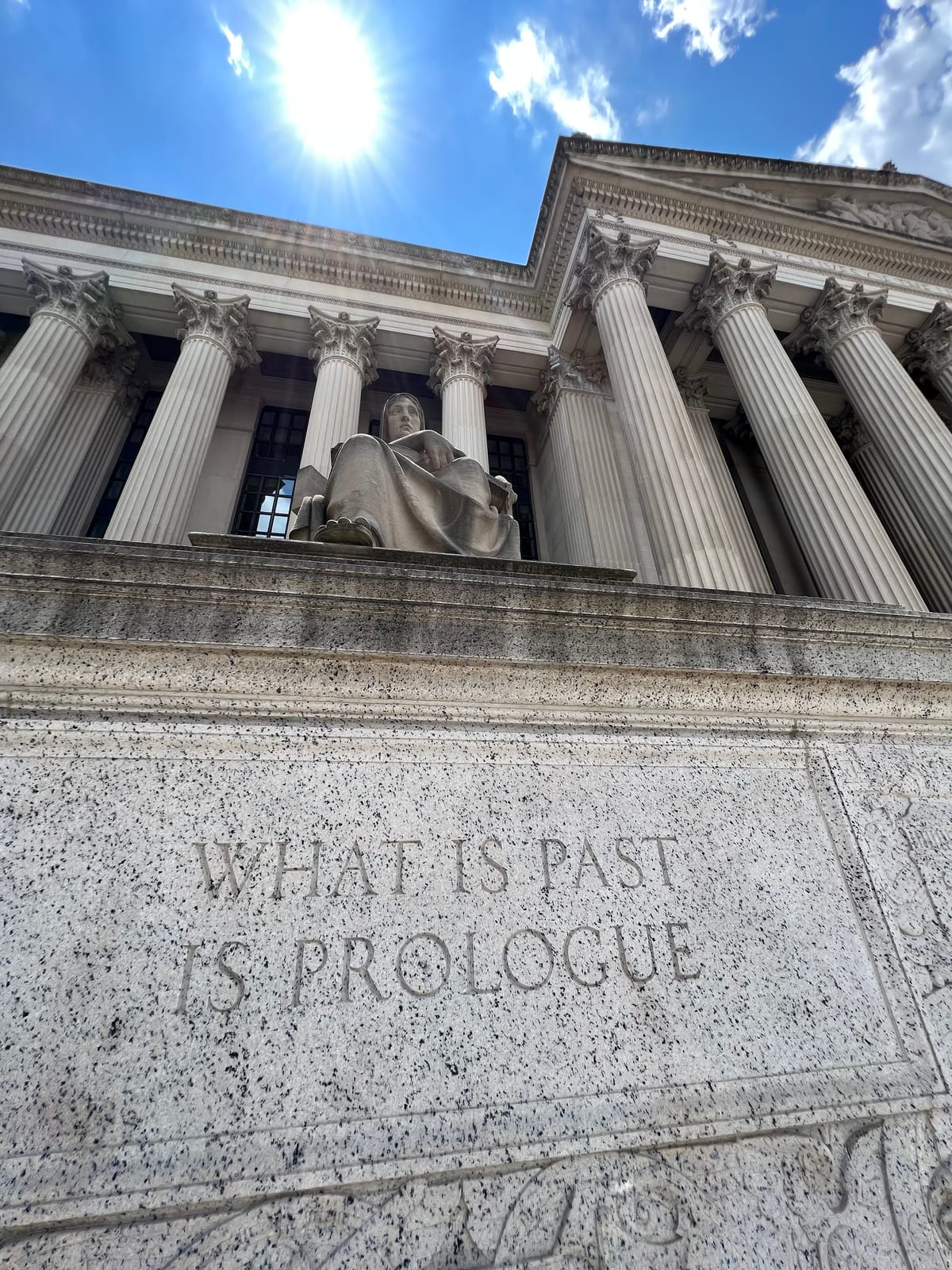
Good afternoon from Washington, where Halloween decorations are going up, autumn leaves are coming down, and I have unbranded myself to as I rolled past another birthday milestone.
I have a backlog of newsletters to write and share that span the events of the past week and the underlying currents of history. Stay tuned!
Today, I want to focus upon some notable evolution over at the National Archives and Records Administration (NARA) that can tell us something about our future present, with an unexpected messenger.
As Jason Koebler reported at the excellent new technology news outlet 404Media, NARA is is encouraging staff to use Google’s “Gemini” artificial intelligence tool to enchande productivity, as evidenced by a copy of the presentation obtained by 404 Media using a public records request (Huzzah, FOIA!) and has plans to launched a new AI tool this winter.
In December, NARA plans to launch a public-facing AI-powered chatbot called “Archie AI,” 404 Media has learned. “The National Archives has big plans for AI,” a NARA spokesperson told 404 Media. It’s going to be essential to how we conduct our work, how we scale our services for Americans who want to be able to access our records from anywhere, anytime, and how we ensure that we are ready to care for the records being created today and in the future.”
A spokesperson that 404 Media granted anonymity to for some reason told Koebler that NARA has “big plans for AI, which include launching a public-facing AI-powered chatbot called ‘Archie.’”
“We are exploring how AI can help us increase access to our holdings around the country. We currently have a handful of AI pilot programs aimed at improving our service to the public while fostering public trust and confidence,” they said. “Ultimately, we want the user to be able to easily find the documents they are looking for in our enormous trove of permanent federal records. Whether you are a veteran, a family historian, an educator, a researcher, or a student, our goal is to connect you with the records as seamlessly as possible.”
NARA plans to tell users, essentially, that Archie may give people incorrect information.
“Our ArchieAI tool will directly address questions of accuracy and disclosure,” the spokesperson said. The specific disclosure will say: “Accuracy: AI-generated summaries and results may not reflect the opinion of NARA and are not guaranteed to be accurate. Historical records often contain factual errors or offensive language, which ArchieAI may repeat or use.”
The archived chat from the presentation that 404 Media published makes it clear that NARA staff have deep and abiding concerns about using AI for their work, with respect to the accuracy of records.
That concern was top of mind for the members of the modernization subcommittee of the U.S. Freedom of Information Act Federal Advisory Committee last term, which is why we recommended that the “FOIA Officers Council Technology Committee and interested agencies publish requests for information (RFIs) on the subject of artificial intelligence (AI) tools and techniques as an aid to FOIA processing” — not that agencies should move forward with incorporating generative AI into search or redaction.
As it happens, I went to NARA’s Sunshine Week event here in DC back in March, where the folks from the Library of Congress, the Justice Department, State Department, NARA not only detailed how they were already using AI for FOIA, but where they were thinking about responsibly using it next. You can watch archived video on YouTube.
During the NARA presentation, we heard about current and future plans.
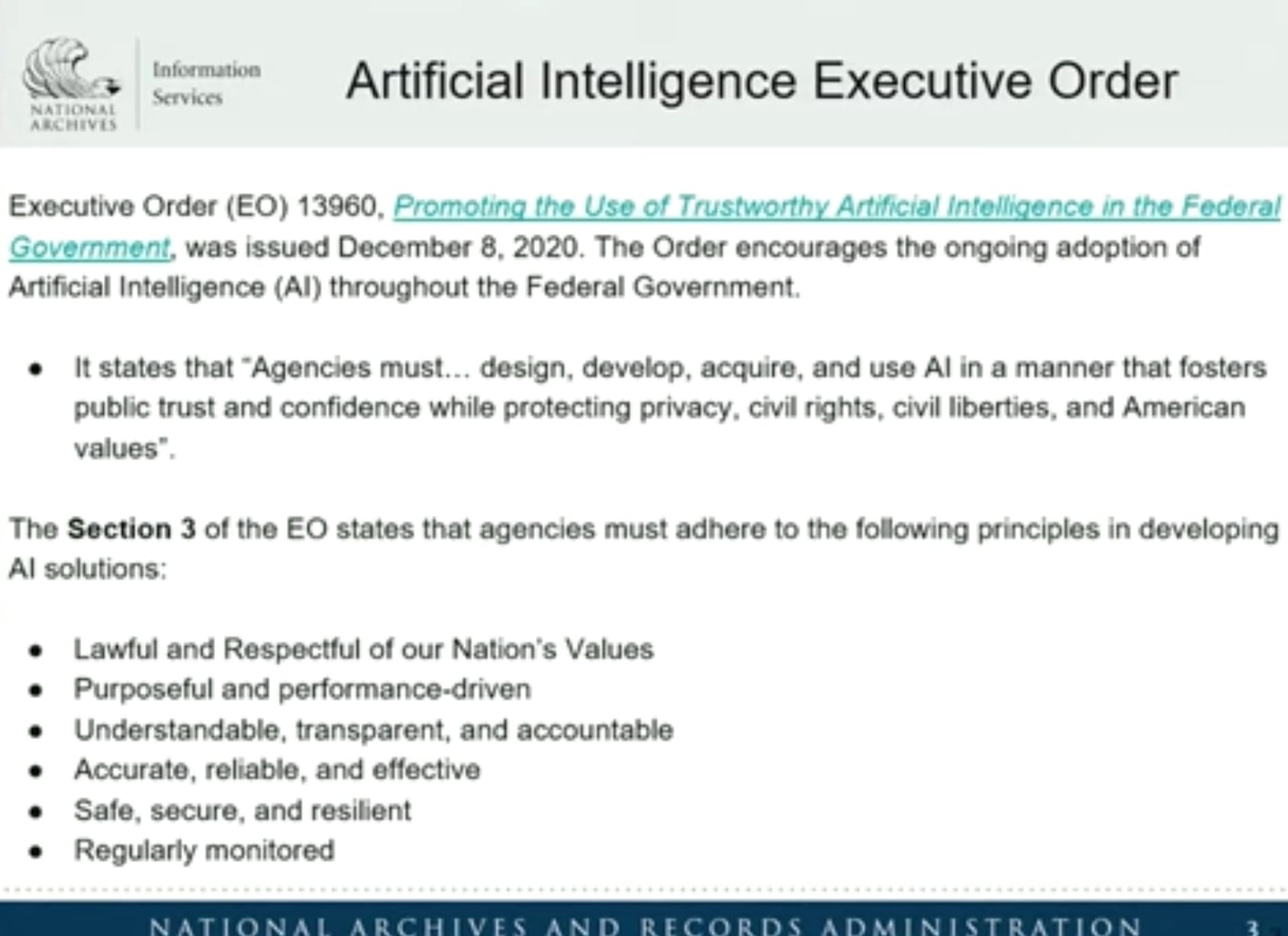
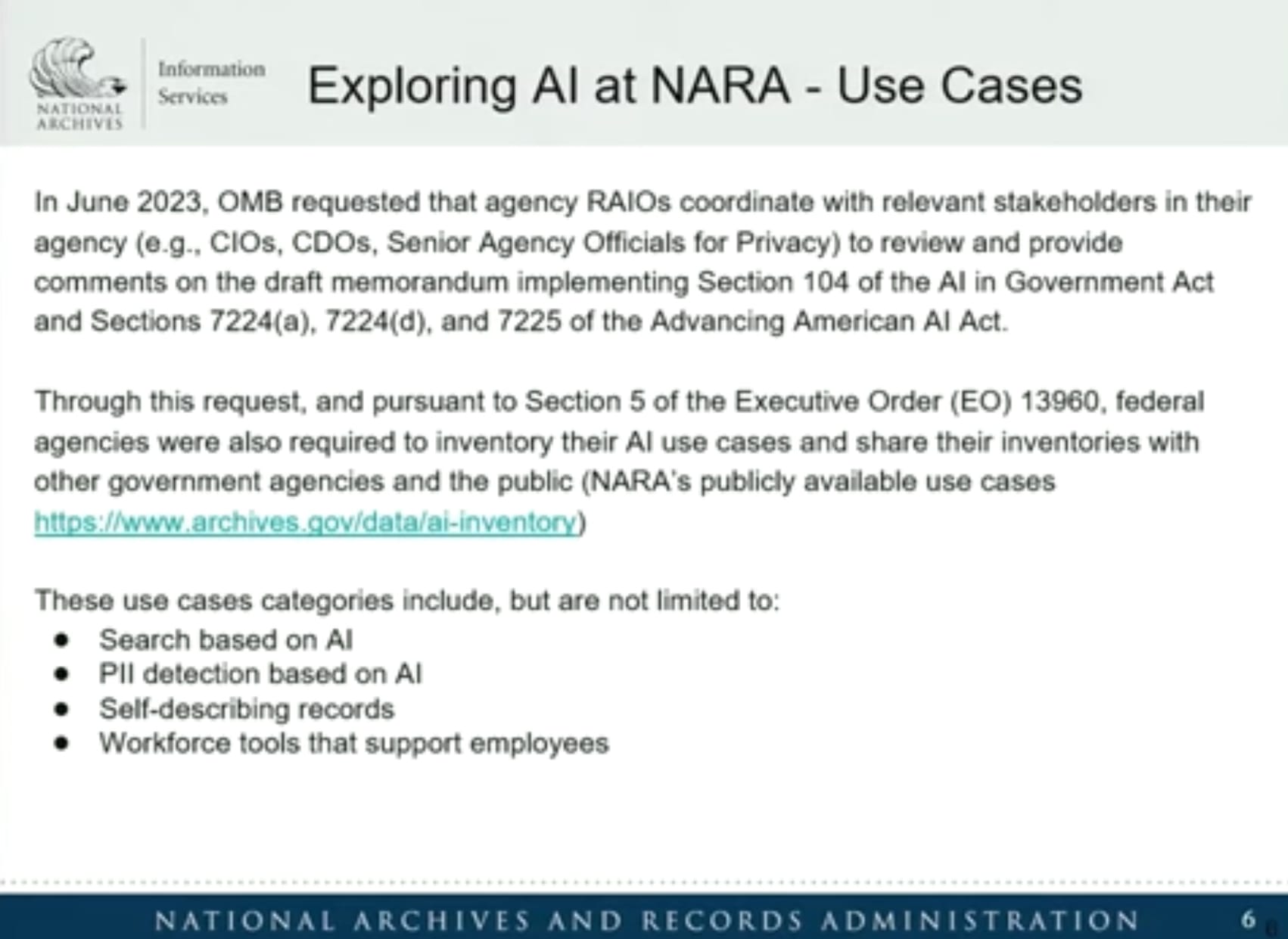
As noted, President Biden’s executive order on AI requires agencies to disclose an inventory of use cases, which NARA has done at archives.gov/data/ai-inventory.
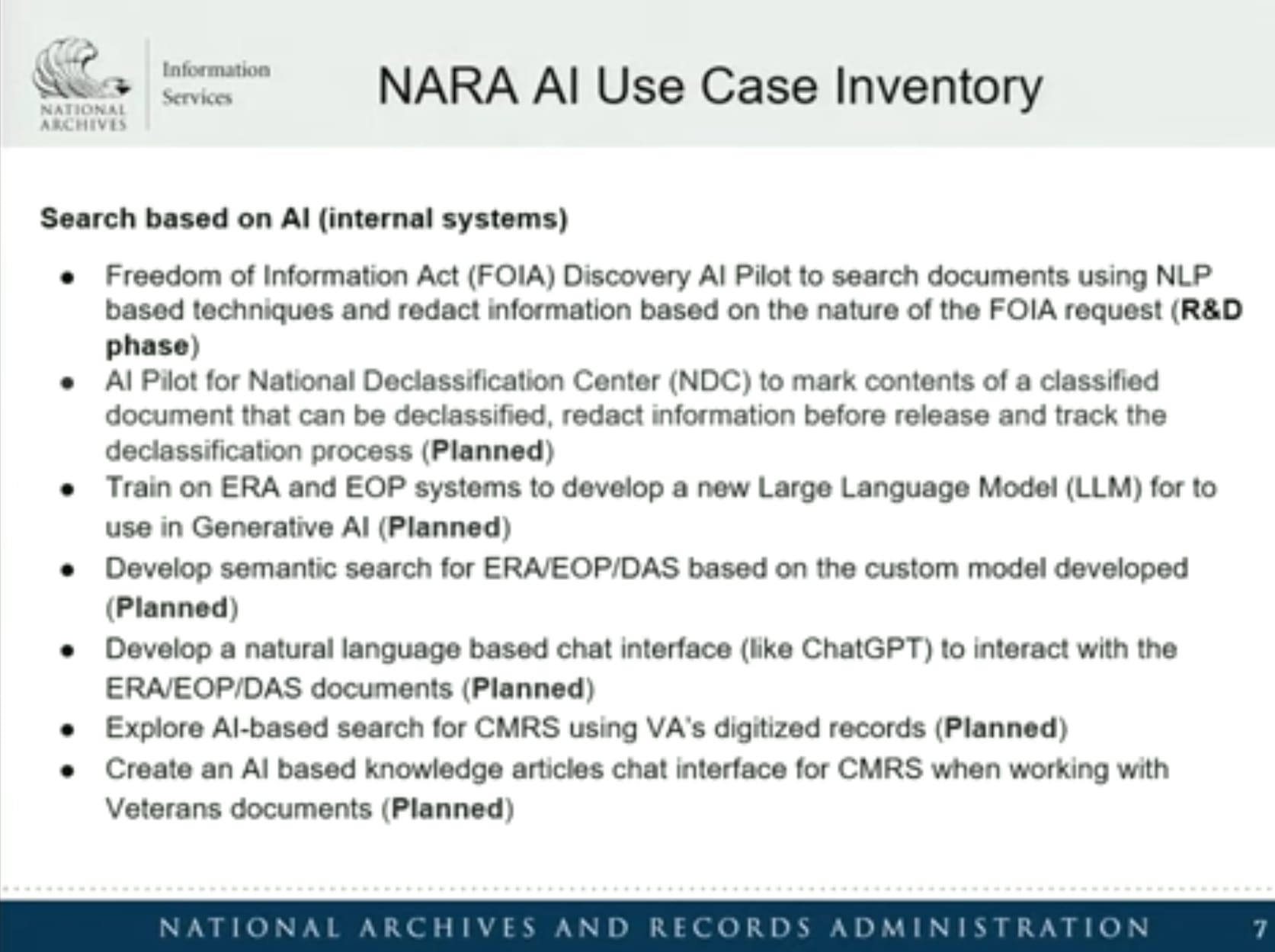
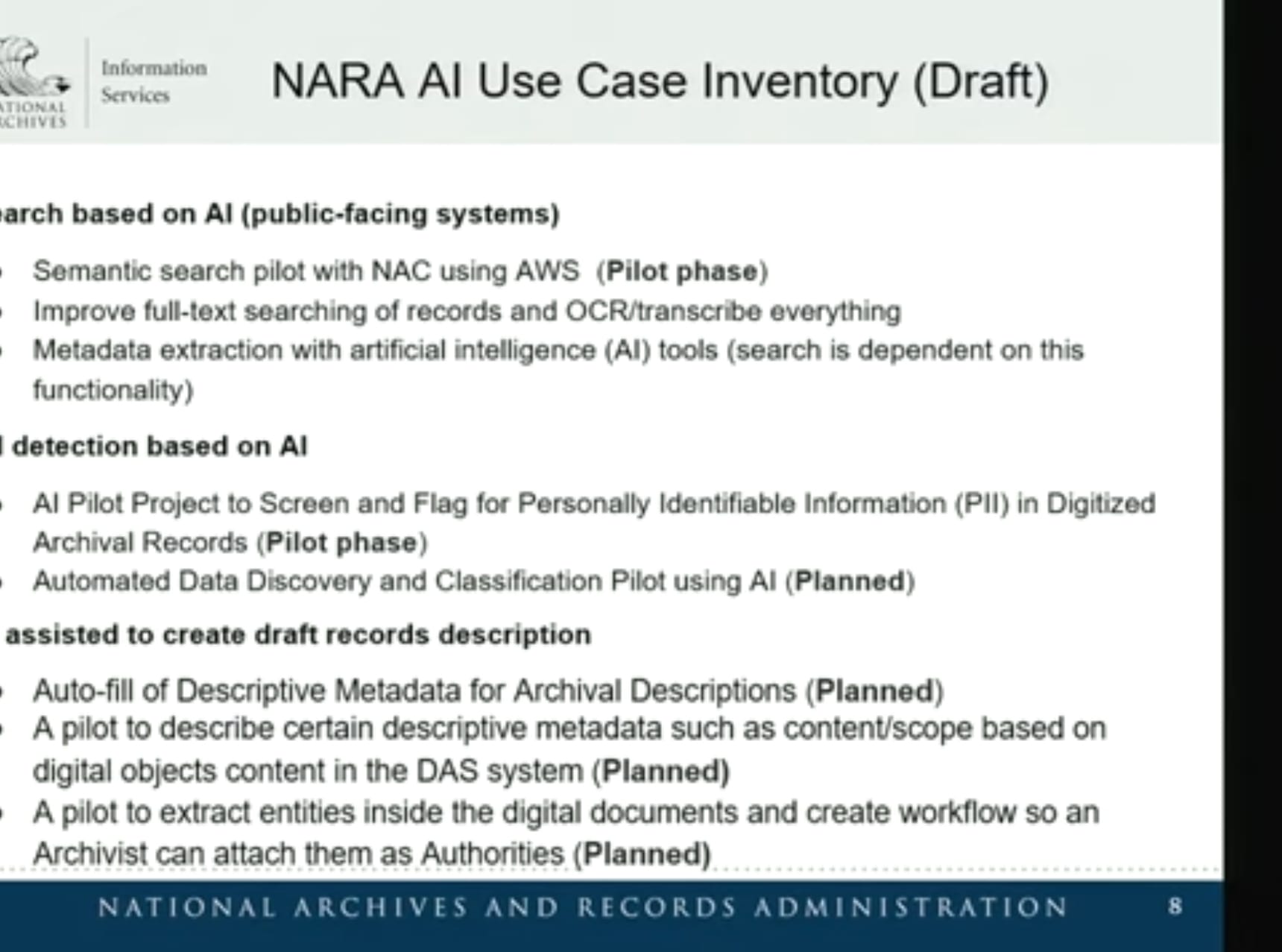
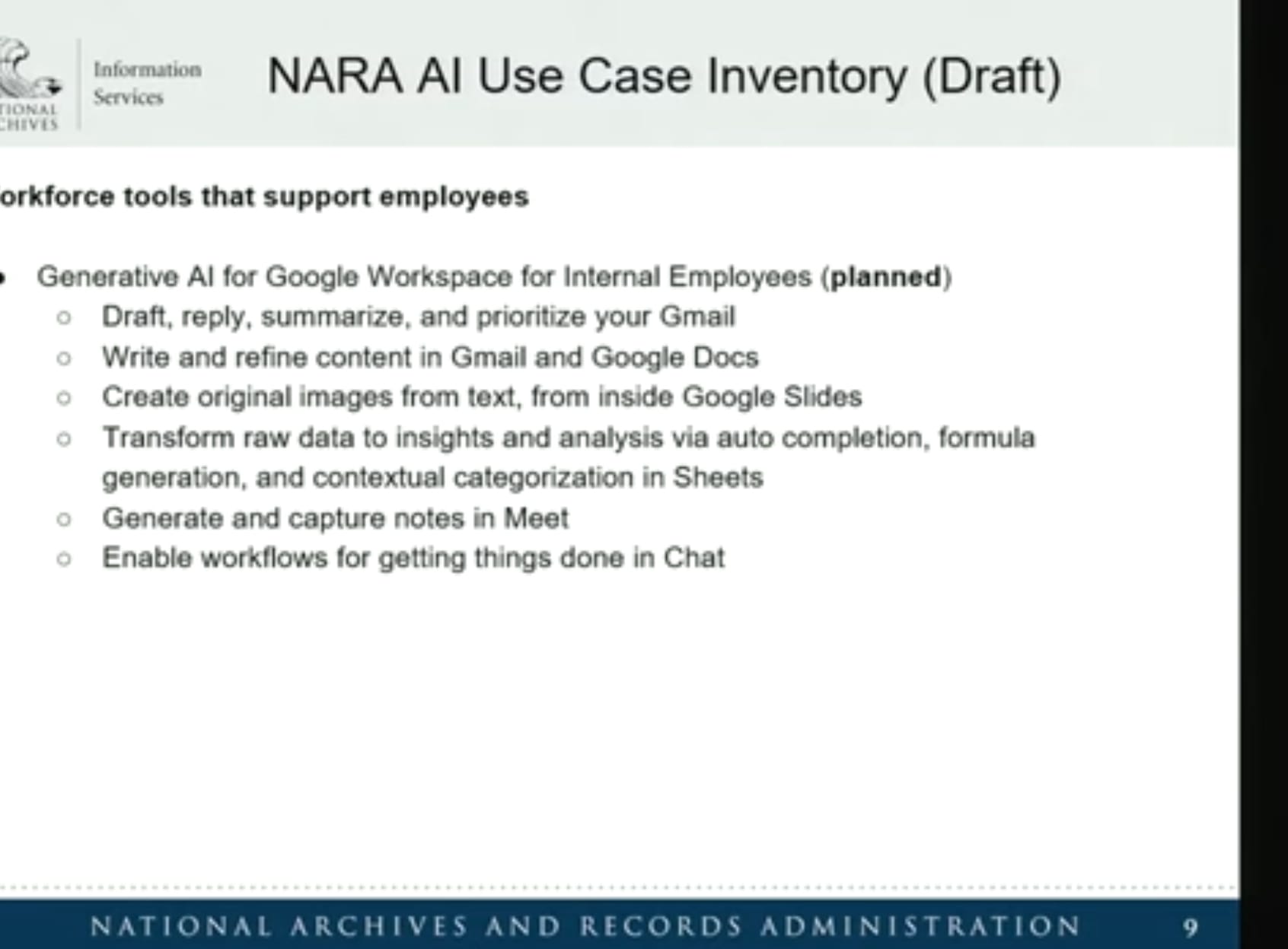
As the final slide details, “generative AI for Google Workspace for Internal Employees” was in the planning stages as of March 2024, with a focus on productivity.
Which is to say, NARA has been transparent about how it is using AI, if you’re interested and paying close attention.
But they can and should be more open and accountable to both internal and external stakeholders, so I took the opportunity to ask the 11th Archivist of the United States (AOTUS) about how NARA will mitigate the risks of inaccuracy over on Threads.
If you missed it, Colleen Shogan has launched an official account to inform and engage the public about the public records she and her remarkable team hold in trust for the American people.
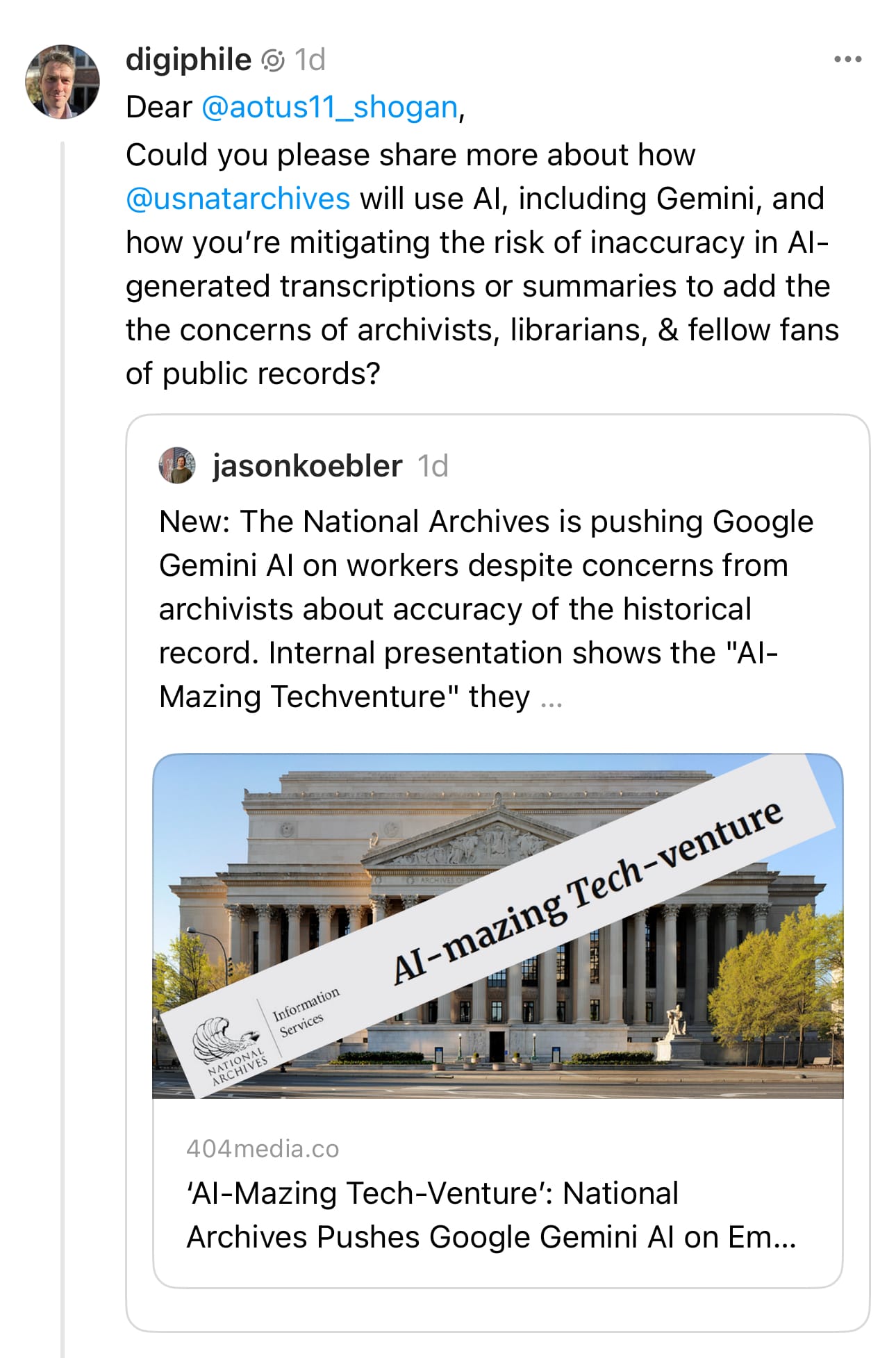
As with her predecessor, I’ve had the opportunity to meet and talk about open government with the 12th AOTUS several times, which may be why she chose to answer in a 5 part thread, transcribed below:
Thanks for your interest! I have said from my first day on the job that access is one of my top priorities for the National Archives. We have literally billions of records, and we will never be able to provide broad access without embracing new tools like AI. But we are not jumping blindly. Like any new tool, we have to learn how best to use it and ensure we are prepared to use it smartly.
That’s what we are doing now. We have a handful of AI pilot programs aimed at improving our service to the public while fostering public trust and confidence. We were able to use AI to identify names in the 1950 Census, which made it much easier to use the day it was released. We’ve seen some promising results using AI to speed up our response to requests for veterans records.
We are exploring other uses too. Ultimately, we want users to be able to easily find the records they want in our enormous trove of permanent federal records. We will always need to have expert NARA staff involved, but AI has the potential to help us improve our cybersecurity, more efficiently conduct FOIA and other document reviews, more effectively search and deliver records, and even manage internal communications more seamlessly.
Our experimentation with AI tools is happening in the context of a larger U.S. federal framework for trustworthy use of AI. What we are learning with AI will strengthen our AI governance, and ensure that we are able to balance innovation and risk management.
WWe take seriously our responsibility to use AI carefully, which is why we are testing and evaluating our early use cases thoroughly. But we are very excited about its potential to help us share our records with all Americans in ever bigger and better ways. 5/5
To my ear, that’s a notable message: NARA needs to adopt emerging technologies to make access to billions of public records feasible and enhance the productivity of the humans on staff, but to do so in a responsible, deliberate, and evidence-backed way. Which is to say, ”move slowly and fix things.”
If you watch the Sunshine Week forum, I bet you’ll come away better informed about how these civil servants are trying to leverage new tools. (Should you make it to the end, you’ll even hear me ask the Department of Justice why it hasn’t issued the policy for disclosure that former President Obama directed, given that the State Department has now adopted it within serious downsides.)
Everyone is right to be concerned about the risk of inaccuracies in summaries, poor search, or errors in transcription.
We should also be concerned about avoiding risk versus managing it, given the explosion of data and electronic records over the past decades.
We should be even more concerned about how grossly underfunded NARA has been for many years, while the demand for more capacity has kept growing. NARA’s budget needs to be increased by billions order for it to deliver on its mission, specifically with respect to declasssification and disclosure.
More on that in future editions.
As always, thank you for subscribing and amplifying Civic Texts, which will not be sustainable without you. Many thanks to everyone who has supported my work, particularly folks who have subscribed to memberships since our soft launch in April.
Please keep sharing these newsletters on social media and forwarding them on email. Organic growth by word of mouth and social recommendations is incredibly helpful. You can always write to me with questions, comments, tips, features, or other feedback at alex@governing.digital or call/text at 410-849-9808.



